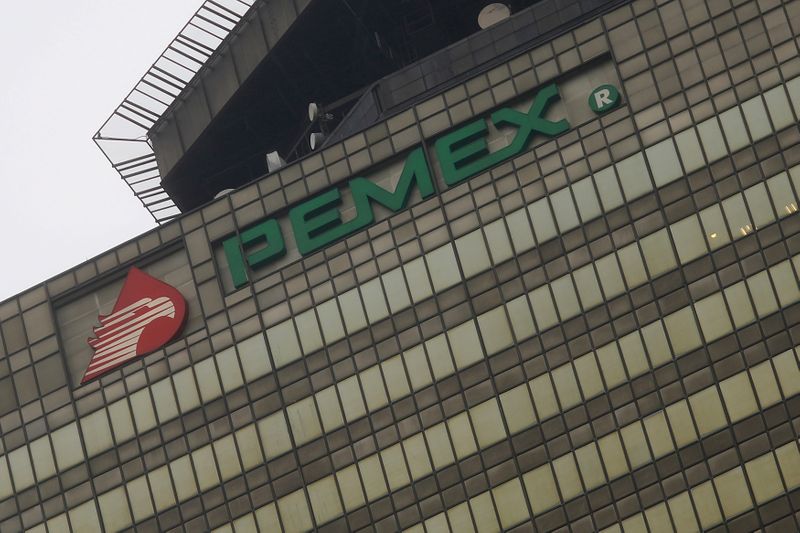By Stefanie Eschenbacher and Rodrigo Campos
MEXICO CITY/NEW YORK (Reuters) - Since Petroleos Mexicanos lost its coveted investment grade rating earlier this month, bond investors have punished the Mexican state oil company, with no clear sign of how the government plans to turn its fortunes around.
President Andres Manuel Lopez Obrador has promised to revive the company known as Pemex, but it remains saddled with more than $100 billion in financial debt. In the first quarter, it posted a staggering $23.6 billion loss.
The grim outlook is becoming increasingly costly, with spreads between Pemex bonds and those of its nearest peer, Petroleo Brasileiro (Petrobras) (SA:PETR4), widening sharply.
"Bond holders are pricing in a higher probability of default for Pemex than for its high yield peers," said Patti McConachie, an analyst at Columbia Threadneedle Investments, which invests in Pemex.
"When you compare Pemex to peers that are also exposed to oil price volatility, and owned by sovereigns, their spreads to their sovereign bonds are much tighter relative to Pemex."
Through March, investors sought some 330 basis points more yield on average to hold a 6.5% Pemex bond due in 2027 <71654QCG5=> than a Petrobras 7.375% bond due the same year <71647NAS8=>.
The gap jumped to 470 bps through April, Eikon Refinitiv data shows. Relative to the U.S. five-year note, the 2027 Pemex bond has a spread of 1,090.8 basis points while Petrobras' stands at 661.5 - a near 430 bps difference, even though both companies have the same credit rating. A year ago, the gap was 77 bps.
(GRAPHIC: https://tmsnrt.rs/35judkI)
Once Pemex began nearing junk status last year, banks warned that investors whose mandates required them to hold investment grade assets would start dumping billions of bonds.
As many as 75% of active investors, including the majority of pension funds, have done so already, Citi estimated. Passive investors, which track indices, will follow suit once Pemex drops out of indices at the end of April.
Investors said Lopez Obrador needs to give some indication he will either change tack, or find some way of finding breathing space for the company.
But he has so far refused to allow new private sector tie-ups for Pemex or water down his plans for an $8 billion new oil refinery - policy shifts that could cheer the market.
Meanwhile, the price to insure against the risk of a Pemex default has risen sharply. Credit default swaps insuring Pemex five-year bonds rose by 255.1% over the year on Thursday and by 164.7% for the 10-year bond, Refinitiv data shows.
Investors with strong nerves see a buying opportunity, arguing Pemex will be propped up. But the rising risk perception increases borrowing costs for Pemex, making it harder for Lopez Obrador to finance plans to increase crude output, boost refining or contain liabilities.
TOO BIG TO FAIL
Fitch Ratings downgraded Pemex's bonds to junk in June.
The second junk downgrade, by Moody's (NYSE:MCO) Investors Services, came after months of warnings that Lopez Obrador was not doing enough to put Pemex's finances on a sustainable footing.
Lopez Obrador has not addressed the descent to junk status and his finance ministry responded only by saying Mexico itself still had favorable access to credit markets. The government has yet to say what new measures it will take to stop the rot.
In a letter to investors, Pemex reiterated it had the "absolute backing" of the government.
Pemex also said ratings agencies had cited the impact from the coronavirus outbreak as a reason for the downgrade. In fact, Moody's had cited Lopez Obrador's policies only days earlier, and underlined the pandemic was not the decisive factor.
The president's single-mindedness and tendency to dismiss orthodox economic arguments he associates with privileged elites have reinforced expectations he will not change course.
"The market is reflecting the fact that (Lopez Obrador's) flagship policies are key drivers of the company's need for material sovereign support, and that his economic policies make it more difficult to deliver that support," said Gorky Urquieta, co-head of the emerging markets debt team at asset manager Neuberger Berman, which invests in Pemex bonds.
Noting that Mexico's sovereign bonds are almost trading flat to Brazil, whose debt is rated junk, Urieta said the downgrade appears to have had "no impact" on Lopez Obrador.
But having hitched his fortunes to Pemex, investors may take some consolation in knowing the president is highly unlikely to allow the company to go under.
"The bad news is the government has still not gotten the message from rating agencies and markets, which means things will probably get worse before they get better," said Aaron Gifford, an analyst at asset manager T.Rowe Price, one of the top investors in Pemex bonds.
"Pemex is too big to fail, which means extraordinary support will ultimately be forthcoming," he added.
